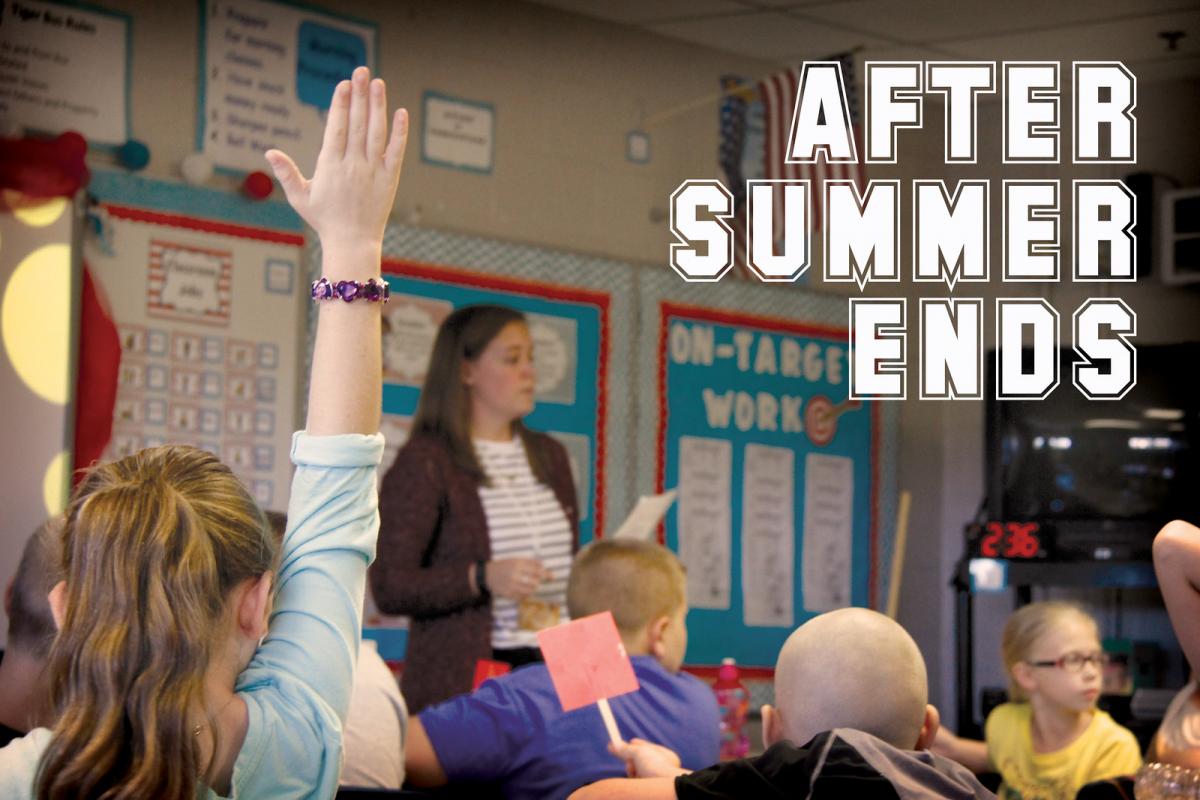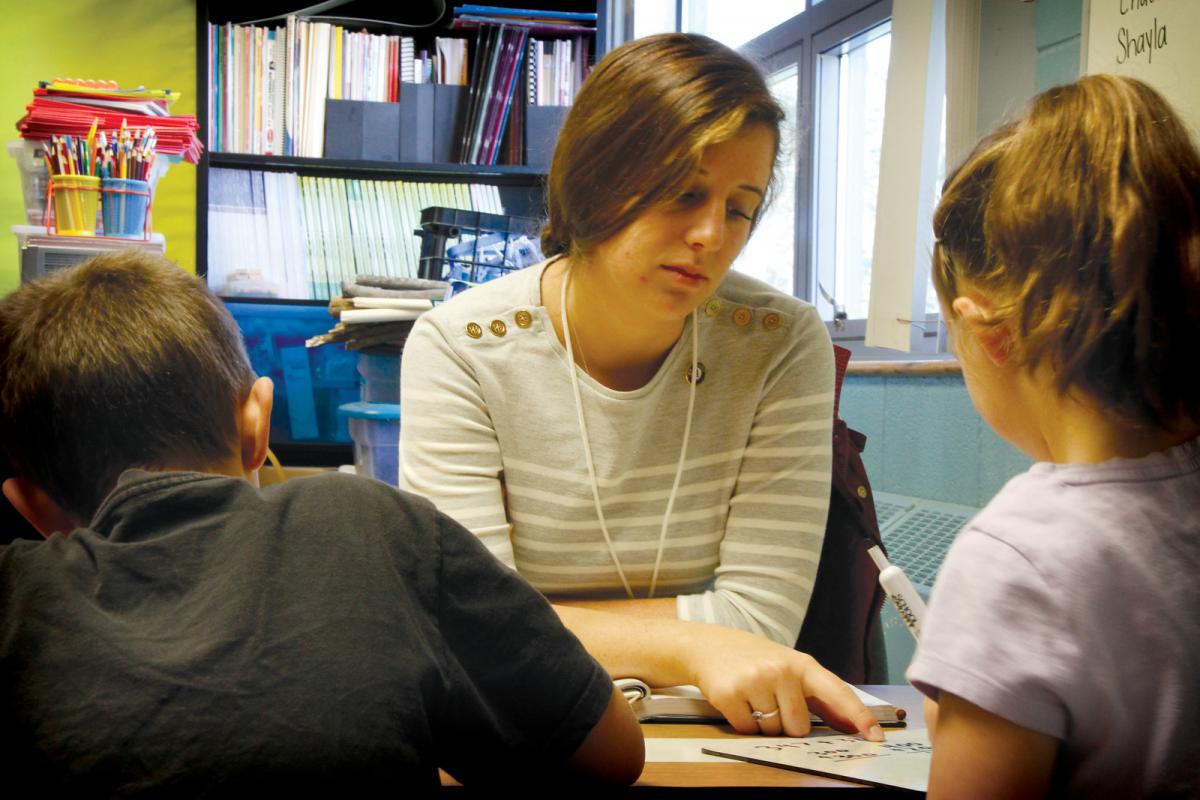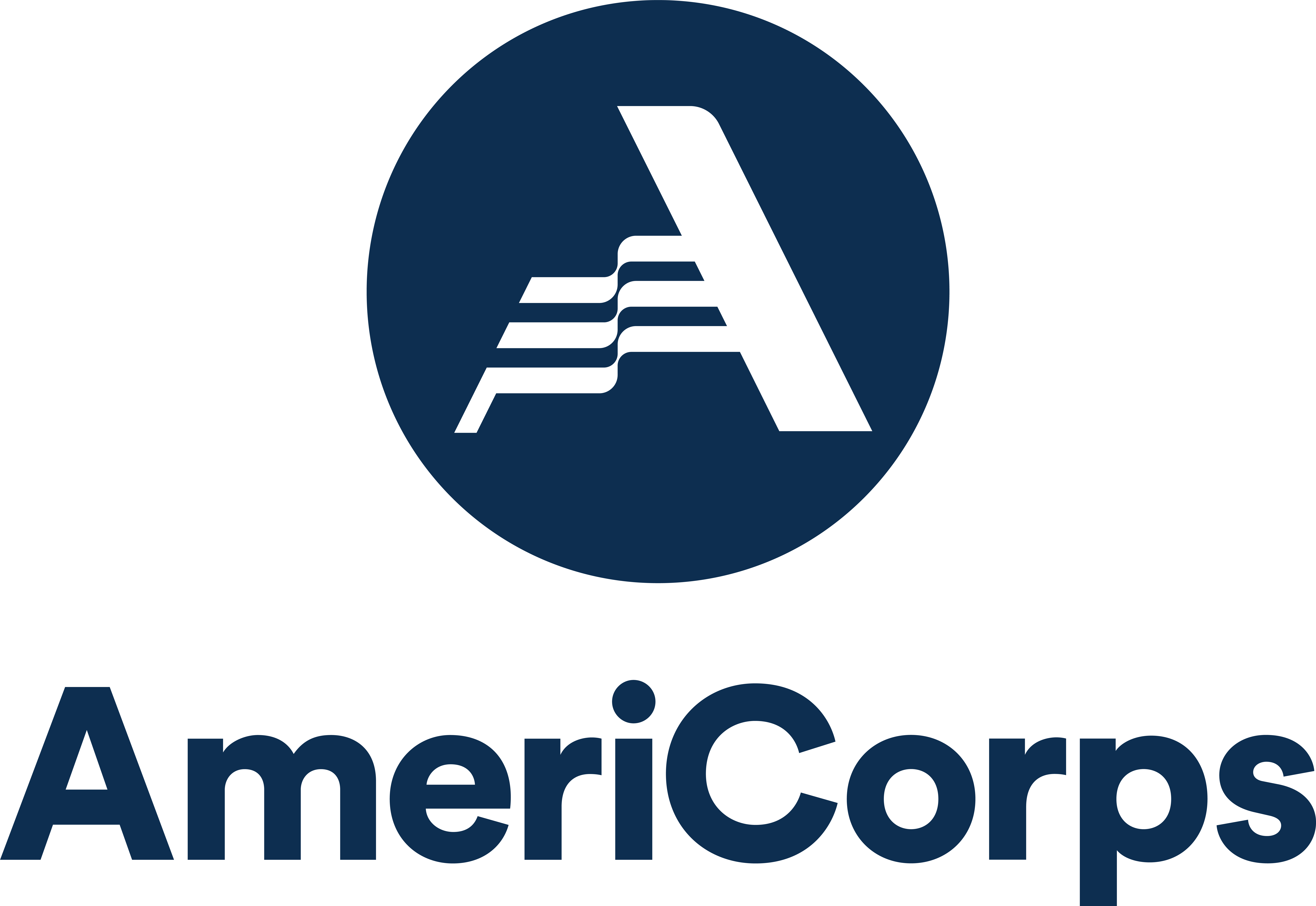
One tiny hand after another dart toward the sky, like distress signals from different corners of the low-lit classroom. While the teacher patiently offers assistance to students at the front of the class, two young women slowly make their way to each of those outstretched tiny hands, kneeling to provide one-to-one counsel. This scene plays out in this same manner for the subsequent 30 minutes and is then replicated across the hall in another classroom immediately after.
"Everybody knows us from summer camp, and everyone always asks the question, 'what do you all do the rest of the year?'" |
These two young women providing aid to the students of Sand Gap Elementary School in Jackson County, Ky. are Alexus Hornback and Jenette Vogt, long-term volunteers with Christian Appalachian Project (CAP). Hornback and Vogt spend four to five days per week in classrooms assisting local teachers in their instruction by providing support, tutoring, encouragement, and whatever other services may be needed. They also aid in leading various additional curricula, including anti-bullying, conflict resolution, and consumerism courses. This is all conducted under the banner and leadership of CAP’s Camp Program, which may come as a surprise to some.
Mike O’Brien, coordinator for Camp AJ, understands the surprise expressed when people learn about the camp’s deep level of involvement in the school system. “Everybody knows us from summer camp, and everyone always asks the question, ‘what do you all do the rest of the year?’”
In fact, one could argue that the work done by CAP’s Camp staff and volunteers throughout the school year is the very heart of the program. By providing much-needed support to underfunded schools and teachers, the camps are quickly becoming an essential part of the educational process in the region.
“In recent years, CAP has become a valuable partner to what’s going on inside the school building. The approach has become like a partnership, where camp plays an integral part to academics within the school building,” explains Sand Gap Elementary Principal, Robert Williams. “We’ve always had a good relationship with Camp AJ and we’ve used them in a supplementary manner, but now they have become integrated as part of the educational process within the school. They are a valued partner and their contributions couldn’t be replaced, because we just don’t have the funding. We don’t have a large pool of volunteers from the community to do what CAP is able to do for our school.”
While the majority of CAP’s services are intentionally focused on meeting the immediate needs of individuals and families, the Camp Program is in the unique position to enact positive change for the future of the region and has the potential to break cycles of generational poverty. Listed as a basic human right by the United Nations, an effective educational experience is as valuable to the children of Eastern Kentucky as the food, shelter, and clothing that CAP seeks to provide.
Williams provides some context for the unique challenges facing students in Appalachia. “We can talk about Appalachia in general and it goes back to socioeconomics. We live in a depressed area. We have high unemployment and a very high free and reduced lunch rate. 65-75% of our students receive free and reduced lunches. You can put poverty in there as an obstacle. We have the constraints of the topography, where many of the kids have never been more than 50 miles from home. They don’t get to experience anything beyond the culture in which they live, which puts them at a disadvantage to peers of their age in other places in the world in different socioeconomic brackets.”
Another long-term volunteer, Emily Dumont, studied Math and Religious Studies in college and worked as a classroom teacher for a year before feeling called from Maine to Kentucky to serve with CAP. “I really like that we’re able to go in and ask the teachers ‘what do you need us to do?’ and we can do whatever they want. That’s very nice, because having been a teacher I had no support. I know how hard it is to give the students the attention they need. It’s different at every school and in every classroom we serve – we provide something different. But we’re able to support the teachers however they need us to.”
 The presence of non-native Kentuckians, like Dumont, in local classrooms provides children the added benefit of being exposed to glimpses of the world beyond their own. Dumont expounds, “At the beginning of our introduction lesson, we tell them where their teachers are from. We talk a little about ourselves. They often ask me, ‘Why are you here?’ I tell them I came here once when I was in college (to volunteer during WorkFest) and I really, really liked it. I want them to see the good things that an outsider would see about the place where they live. I don’t think they always recognize what those things are.”
The presence of non-native Kentuckians, like Dumont, in local classrooms provides children the added benefit of being exposed to glimpses of the world beyond their own. Dumont expounds, “At the beginning of our introduction lesson, we tell them where their teachers are from. We talk a little about ourselves. They often ask me, ‘Why are you here?’ I tell them I came here once when I was in college (to volunteer during WorkFest) and I really, really liked it. I want them to see the good things that an outsider would see about the place where they live. I don’t think they always recognize what those things are.”
Williams claims that, with the exception of about ten years, he has been at Sand Gap Elementary his whole life – as a student, a teacher, and now, as principal. He sees some significant positive movement in educational trends for his student population and considers CAP’s involvement to provide complimentary support to the trends. “What we’re doing now, in what I would call the “response to intervention” age in education, is looking at the children who are least successful – the struggling learners. We’re focusing our instruction on those students in an effort to remediate them so they make gains every year. The CAP staff and volunteers are an integral part of this response.”
O’Brien explains, “We target the students who are close to where they need to be, but not quite. The teachers can give us a group and we give them individualized attention to get them up to speed. That also frees up the teacher to focus on the kids who are further behind. We also work with that group of students and give them one-on-one or even two-on-one attention. One of the reasons they’re behind is because of the wedge between their parents and the education system. They are infrequent attendees. They miss class, they miss tests, they miss instruction, so we are able to give them that individualized attention to help them get caught up with the rest of the class, so they don’t continue to fall further behind.”
"I really like that we're able to go in and ask the teachers, 'what do you need us to do?' and we can do whatever they want." |
“It feels like sometimes this is a big heavy thing that we’re doing,” O’Brien continues, “but day-to-day, we just get to go hang out with kids and have fun. But it’s the consistency, the year-round support, and meeting kids where they are every day that is making the impact. The fact that we are here and that CAP has been here – that’s the cool thing about the schools, they let us in because they know that we’re going to be here. A lot of other programs, even long-term programs, have come and gone, but we’re still going to be here. I think they know they can count on us, whether it’s a different face or a different time or a different service that we’re providing, we’re going to be here when we say we will.”
It is clear from the conversations of the camp staff and volunteers that the goals of camp and the goals of in-school leadership training are complementary.
“When I think about Reverend Beiting starting the first camp more than 50 years ago, he wanted to give kids a safe place to come during the summer. It expanded into what we’re doing now. It’s always been about building those relationships with the children, with their families, and with the community. We’re getting more intentional because of the continuity,” explains Liz Phelps, Manager of Camp AJ.
Dumont also sees the connection between camp and in-school service. “Being able to see the kids in different aspects of their lives is so special; we get to see the kids in the classroom and then we see them in math club and then we see them at camp. So they know us and they trust us. They want to do their best for us, because they know us from so many different areas – they want to prove to us that they can do it. It’s nice to see them work hard. I’m lucky because I’ve gotten to see a lot of the students grow up a little bit. I’ve gotten to see them become more motivated, more independent in their work, I’ve gotten to see them gain new understanding.”
The coordinator for Camp Shawnee, Caitlin Speigle, also provides services to local schools, but is limited by a need for additional volunteers and resources. Describing herself as a “one-woman show,” Speigle visits four schools on a regular basis, providing both anti-bullying curriculum and character-building education. According to Speigle, “We are planting seeds, and we may never get to see them germinate and grow, but we get to know that we helped develop essential life skills and instill good character in these kids. Even if we are just making a difference in one child’s life who is being bullied, feels alone, and doesn’t know what to do, that’s enough for me.”
O’Brien echoes the need for additional resources and volunteers, saying, “The need is definitely there. If we had 20 volunteers, we would have something for every one of them to do all day, every day. There are some teachers who use us so well, we could put a volunteer in that classroom every single day.”
For every little hand sending up a distress call in Sand Gap Elementary, vital aid is being provided to ensure their success. Principal Williams enthusiastically states, “We have our CAP folks here and we know we can depend on them, we know they’re going to do a good job, we know their hearts are in the right place. And the fact that they come in here and make a difference with the students who need a difference made – I kind of like these guys and gals. We want to get the news out that something good is happening in the hills, and these folks are an integral part of it.”







